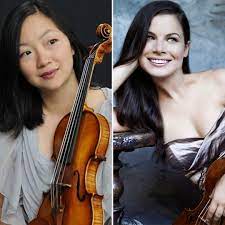Laureate Series brings back to town two distinguished IVCI participants for a duo recital
A new work gives special distinction to this week's concert appearance by Bella Hristova and Juliette Kang right away. But after the bracing "Miasma" by Nokuthula Ngwenyama opens their duo recital, there is plenty to revel in for pure charm and comfort. An audience of about 90 at Indiana Landmarks Center got the direct effect with the "live" presentation on March 23. The concert, part of the International Violin Competition of Indianapolis' Laureate Series, can be accessed online at www.violin.org through April 9.
The young composer was on hand to supplement from the stage the challenging program notes she wrote for patrons. "Miasma" is an in-depth response to Covid-19, based on musical interpretation of the virus' genetic protein sequences. That way of working makes the piece of extraordinary interest during the pandemic.
But when we emerge from this global health crisis, "Miasma" may also deserve currency as a worthy successor to other works for solo violin, evoking J.S. Bach and Eugene Ysaÿe. To be sure, it's often hard to detect much viability for new music beyond the advocacy of its premiering artist. Yet the legacy of both Ysaÿe and Bach remains strong among all concert violinists, and the roots of the new piece appear to be strong.
 |
| Juliette Kang and Bella Hristova |
In fact, when Hristova commissioned the work through a Young Concert Artists grant, she requested that Ngwenyama keep in mind the music of both the late romantic Belgian and the baroque German composer. Both are honored without the lame veneration of pastiche. The arresting opening has rapid tremolo figures flecked by left-hand pizzicati. A sweet melody emerges, of which Hristova makes the most; the romantic flair and love of the violin at its most idiomatic connect directly with the Ysaÿe persona.
There is a sense of crisis that's woven amid reflective episodes. Suggestions of tension and disturbance, mirroring the anxiety the virus continues to generate, lead to flashy passagework, some of it in sequences a la Bach. The ultimate effect is that of virtuosity triumphant, with a retrospective acknowledgment of adversity overcome. The emerging calm of understanding infectious diseases once ascribed to "bad air" reflects the way the viral code of the current virus ends in a long series of As; so does "Miasma," with A sounded in different registers in conclusion.
Kang's solo turn comes with Fritz Kreisler's Recitativo and Scherzo-Caprice, op. 6. After the firm annunciatory quality of the first part, the Scherzo-Caprice lives up to its light-hearted name, rhythmically nimble and charming in Kang's performance. Joined by pianist Chih-Yi Chen, Kang offers two pleasant miniatures by the short-lived French composer Lili Boulanger: "Nocturne" and "Cortege." Boulanger managed to express a personal style in her small output; these two pieces put forward the fragile and playful aspects of her nature, respectively.
The gold medalist from 1994 (Kang) and the laureate from 2006 (Hristova) joined forces in two works. Ysaÿe was again heard from in his Sonata in A minor for Two Violins. Sometimes his works seem content to be about the violin more than about the music itself; that's an acceptable emphasis when it's carried out with so thorough a grasp of the instrument as this composer always displays. And that's what we hear in this duo sonata, which gives Kang and Hristova great opportunity to show how well they work as a team. The tempo suppleness and matching of tone and expressiveness are first-rate in this performance — from the strongly defined opening to the bravura finish of the last movement.
With Chen at the piano for the program finale, the duo presented Moritz Moszkowski's Suite in G minor for Two Violins and Piano, an expansive work in four movements. The trim compactness of the first movement is less a feature in what follows. The work relaxes into a tenderness at moderate tempo in the second movement, in which Kang's and Hristova's feeling for the Polish composer is quite evident. The slow third movement, with its languid, drifting phrases, is distinguished once again by a tempo flexibility that the pianist fully shared. The dashing rondo finale, capped by a brilliant coda, has attractive episodes to contrast with the main theme, including some fine moments of display for the piano.
The encore, which the audience response Tuesday night fully encouraged, is an ingratiating, frankly trivial waltz by Dmitri Shostakovich from his Five Pieces for Two Violins. It helps banish any pandemic anxiety that may have been fueled, however worthily, by the program's brand-new piece.



Comments
Post a Comment